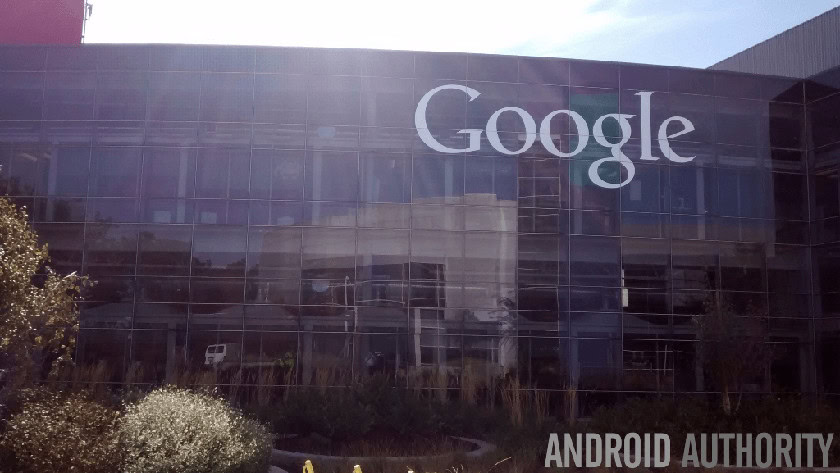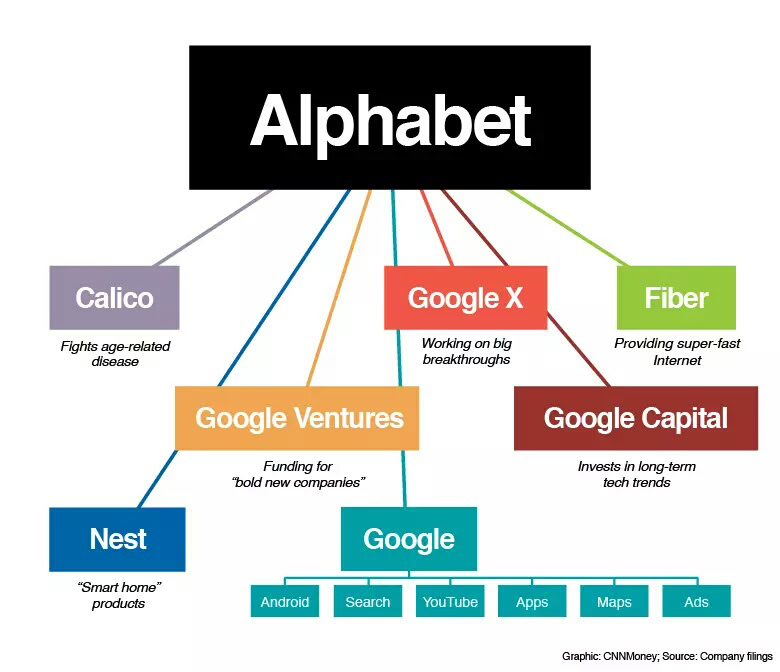Affiliate links on Android Authority may earn us a commission. Learn more.
Alphabet: What you need to know about Google's new parent company

In the modern world of leaks and rumours well before most official announcements, it’s rare that a company truly shocks the industry. Google, being Google, managed to do just this yesterday. After what could be years of planning, Google yesterday announced Alphabet, its new parent company that encompasses all of its brands, including Google.

What is Alphabet and what does it mean for Google as we know it? Let’s find out.
What is Alphabet?
To quote Alphabet CEO (and Google Co-Founder) Larry Page:
What is Alphabet? Alphabet is mostly a collection of companies. The largest of which, of course, is Google. This newer Google is a bit slimmed down, with the companies that are pretty far afield of our main internet products contained in Alphabet instead.
Essentially, this means that Google as we know it will be split off from the other divisions such as Life Sciences, Calico and its investment arms, Google Capital and Ventures, which will become part of Alphabet.
Why the change to Alphabet? Simply put, Google was too big for its own good and as each of its subsidiaries grew, the company would find itself stretched. Under the old structure, the company would need to plan strategically as a search giant/thermostat maker/operating system developer/internet provider but now, the slimmer Google can just focus on its core aims of providing Internet products and services to consumers, like you or me.
Page continued:
“Sergey and I are seriously in the business of starting new things. We’ve long believed that over time companies tend to get comfortable doing the same thing, just making incremental changes. But in the technology industry, where revolutionary ideas drive the next big growth areas, you need to be a bit uncomfortable to stay relevant.”
Looking at Google’s new Android M operating system, it’s clear that the move is designed to prevent the businesses from only making iterative advancements as opposed to real innovation and going forward, the slimmer Google should hopefully be able to innovate more easily.
What does Alphabet mean for Google as we know it?
One of the biggest changes in Alphabet is the ability of each business to have its own CEO and this is likely to be one of the biggest reasons behind the new structure; as a division of Alphabet, Google is now able to run independently of the other businesses and focus purely on its end product.
[related_videos title=”Diving into Android M:” align=”center” type=”custom” videos=”613277,612410,613281,612594″]
The newer slimmed down Google will be run by Sundar Pichai, who steps up to become the new CEO of Google. He will control all of Google’s divisions, except for YouTube, which will continue to be a sub-division of Google but will be run by current CEO Susan Wojcicki. By letting Pichai take the reigns at Google, both Page and Alphabet President (and Google Co-Founder) Sergey Brin, can take a step back and focus on the future. Page said:
Sergey and I have been super excited about his progress and dedication to the company. And it is clear to us and our board that it is time for Sundar to be CEO of Google. I feel very fortunate to have someone as talented as he is to run the slightly slimmed down Google and this frees up time for me to continue to scale our aspirations … Google itself is also making all sorts of new products, and I know Sundar will always be focused on innovation—continuing to stretch boundaries.
One thing that’s not immediately apparent is whether Page will continue to lead Google’s product launches (such as Google I/O) or whether Pichai will now be the main man. With Google expected to launch its new Android M OS alongside new Nexus devices later this year, there won’t be long until we find out.
The new structure
What does the new structure mean for the other companies inside the new parent company? It’s simple really; they will have their own CEO and mission and can execute this without worrying about the other businesses. One benefit of the restructuring is that businesses such as Google and Nest Labs are ready for other people to run allowing Page and Brin to take a step back and focus on products for the future.
Look at Calico – the business focused on combating disease and extending human lifespan – and it becomes clear that this is a business with the potential to be as big as Google itself. If there’s anyone who can find a way to defy age, it’s the company that owns the world’s largest search engine and you wouldn’t bet against them taking it to the big pharmaceutical companies.
The other businesses that will also become part of Alphabet with their own leadership teams are:
- Google X houses the most secret of Google’s projects – including Google ATAP – and being spun off into Alphabet allows it to focus on products for the future without worrying about the Google of the present. If you use a Google product now or in the coming years, chances are that it was developed inside the Google X labs.
- Google Ventures and Google Capital are Alphabet’s two investment arms and spinning off from Google itself should make acquisitions a lot simpler as well, with less concern and stigma around data being collected and used by other Google businesses. The spin-off should also make it easy for Alphabet to buy competing businesses and possibly get around competition regulation, although this is yet to be seen.
- Nest Labs has changed the way we automate mundane tasks inside our home and continues to do so. During the acquisition of Nest Labs, Google went to great lengths to confirm that Nest was not related to its search business – over fears that it would use the data in search – but the new structure of Alphabet means this is no longer a concern. Nest Labs continues to revolutionise the way we do things in our home and a focus on the future – led by current CEO Tony Fadell – could see the company deliver an integrated smart home suite.
- Fiber will continue with its aim of delivering 1Gbps internet and TV services at an affordable price in a bid to shake up the market without worrying about the stigma attached to being a Google company handling customer data. Presumably Project Fi will also fall under this division although it is technically related to the core Google business as well.
Alphabet is definitely an interesting change for Google but with the giant arguably becoming too big for its own good and being stretched thin across its various businesses, the change should hopefully streamline the operations of all the companies.
Money, money, money
The restructuring should also mean significant changes for shareholders and the stock market alike. Under its old structure, the wider Google group reported all its figures together with only some declaration of individual performance, but the restructuring should hopefully provide some more transparency.
[related_videos title=”Top Phones in video:” align=”right” type=”custom” videos=”630400,629200,629182,623586,616170,614646″]As an example – under the old structure, Google’s Venture arm may have invested $500 million in a bold new startup only for it to fail and this would have an impact on the wider Google group financials. As such, shareholders may have questioned whether it would have been better to invest the money in developing the core Google businesses. Under the new structure, the company could report the Google Ventures and Google financials separately and while this may not change shareholder opinions about the money being spent, it should provide greater transparency on the performance of individual units as well as the company as a whole.
For the stock market as well, the restructuring could prove to be a blessing in disguise; one of the hardest jobs in the world is predicting the future as you can never be completely accurate. If Alphabet were to report on the individual financials of each division, it would provide the stock market with an indication of the future. Want to know where Google is likely to be in five years (from a financial viewpoint)? Simple – primarily look at the recent performance of Google Ventures and Google Capital (alongside the other businesses of course). Want to know more about Google’s dominance of the search industry? Simple – just look at the performance of the core Google business.
Instead of wading through financial documents, the new reporting may provide more transparency and a clearer indication – at a glance – of where the company currently stands and where it may be in the years to come. For the company itself, the restructuring may also mean they can take advantage of tax breaks but this is yet to be confirmed and we won’t quite know how it are set up until it reports its first set of financial results.
Alphabet Soup
The restructuring of Google to form Alphabet (including a slimmer Google) may seem complex but it’s rather simple; the core Google business (including Search, YouTube, Android etc) becomes a slimmer Google, while its other businesses (Calico, Nest Labs, Venture etc) become part of Alphabet.
If you’re still not sure on the structure, CNNMoney have published this very easy-to-digest infographic showing the changes:

So there you have it – Google is now Alphabet including a slimmer Google. For consumers, you probably won’t notice any changes as Google (at least as we know it) will remain the same.
You’ll still be using a Google Nexus device and Google Search but the wider unrelated businesses will no longer affect the ability of Google to adapt and change to the market. From a mobile perspective, this is definitely a good thing and maybe now, Google will be able to really innovate in everything it does going forward.